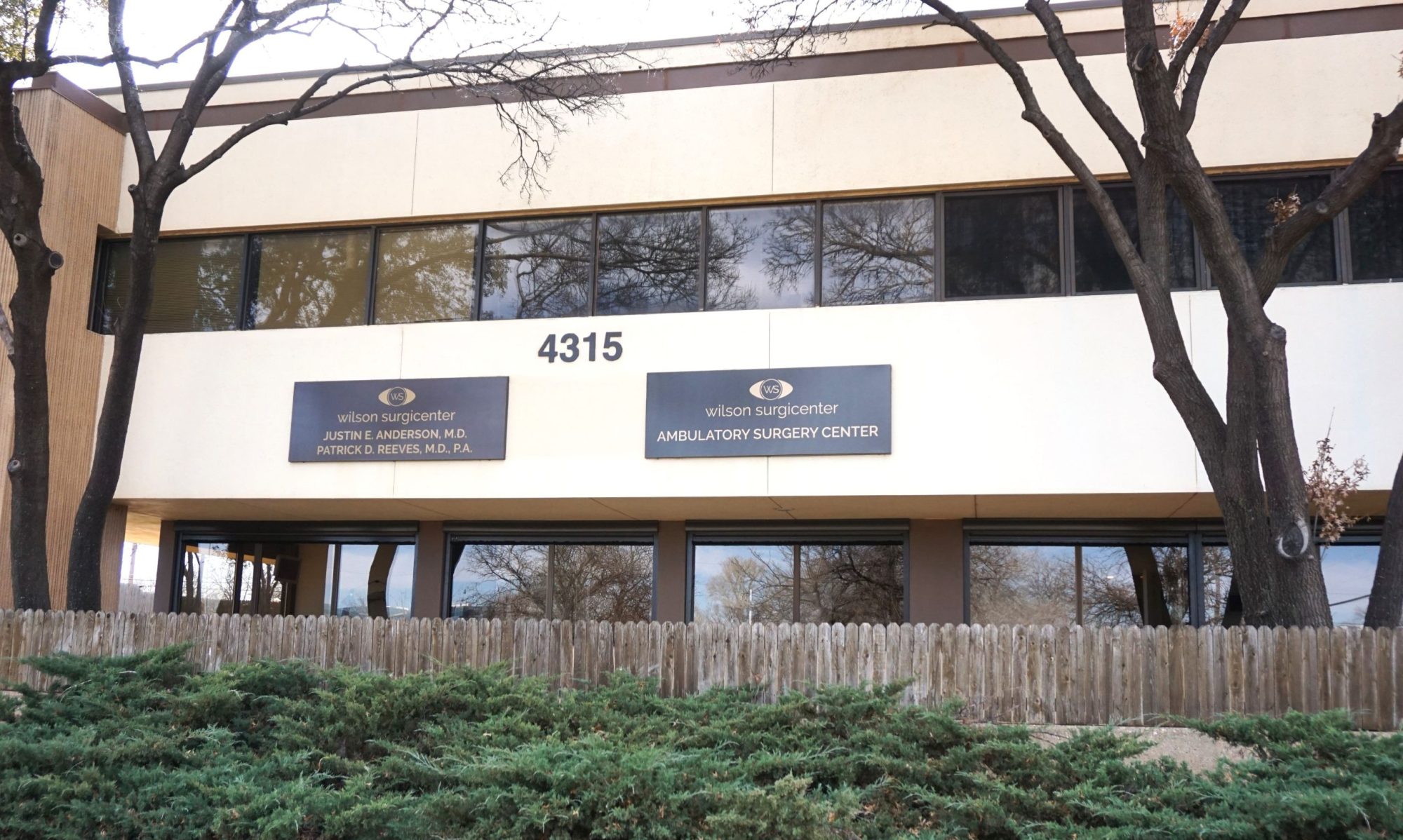What to Expect
NOTE: These are generic instructions so that you can know what to expect, in general. Specific instructions/information unique to your needs will be given to you at your first clinic visit. Individual results will vary. This is for informational purposes only and does not constitute medical advice.
Cataract Surgery – Making an Appointment
At Wilson Surgicenter, Dr. Reeves and Dr. Anderson specialize in cataract surgery. A visit to our office usually begins when your primary eye doctor has diagnosed you with cataracts. Your primary eye doctor is the optometrist or ophthalmologist who sees you on a routine (annual) basis for glasses, contacts, or other eye issues. Your primary eye doctor may schedule your appointment, or you may call and schedule an appointment once you have been told you have cataracts.
Our phone number for appointments is (806) 792-2104.
Your First Visit
At your first appointment your eyes will be dilated, so having a driver to take you home is advised. This appointment will be a clinic visit. You will receive a comprehensive eye exam to evaluate how severely cataracts are impacting your vision. In addition to the exam, your eyes will be measured by laser and/or ultrasound to determine which cataract lens implant would be best for you.
At this visit you will discuss your goals for vision correction with cataract surgery. Is your goal great distance vision? Or great near vision? Or both? Have you been wearing monovision contacts and would like to set your eyes permanently to monovision without having to put in your contacts? What about astigmatism? What available lens implant option would be best for you? You can read more about cataract surgery and lens implant options here.
By the end of your first visit, you and your surgeon will have worked out an individualized vision plan. The ultimate object of this visit is create plan that best corrects your cataracts and meets your vision goals, depending on your unique situation.
NOTE: Not all patients are candidates for all options available with cataract surgery due to other diseases that may be present (e.g. macular degeneration, dry eye, diabetes or other eye issues).
You will also receive all of your pre-surgical instructions in verbal and written form at the conclusion of this visit. Finally, you will pick a date for your first cataract surgery (only one eye is operated on at a time in the United States).
Prior to Cataract Surgery
Prior to surgery, most patients will:
- Begin your cataract surgery eye drops containing antibiotics 2 days prior to your surgery
- Refrain from wearing eye makeup for 2 days prior to surgery
Surgery Day
Our surgery center is open on Tuesday and Wednesday morning. You do NOT have to go to the big hospital for your cataract surgery. On the morning of surgery we ask that you:
- Have a driver. You cannot drive home after surgery due to the anesthetic effects
- Have only a light breakfast (nothing heavy)
- Nothing to eat or drink (nothing by mouth) for at least 2 hours prior to your arrival
- Put one drop of your dilating drop in the eye to be operated every 5 minutes for a total of 3 drops (usually a red-topped eye dropper).
- Put one drop of your cataract surgery eye drops containing antibiotics (usually a purple-topped eye dropper)
- Wear comfortable, loose-fitting clothes and no jewelry
- If you are a diabetic, bring your blood glucose meter
Usually you will be at Wilson Surgicenter for one-and-a-half or two hours the morning of your surgery, although the surgery itself only takes about 10 minutes. Why so long? First you are prepared for surgery with monitors and the application of eye drops. Then we start an IV for medication. Then you are escorted to the operating room (OR).
In the OR the anesthetist will administer medication to relieve anxiety via your IV. It is normal for you to be awake and breathing on your own during surgery. However, patients usually are not worried or anxious because this medication is a mild sedative, much like Valium. In addition local anesthetic or anesthetic eye drops will be administered to ensure that your eye is numb and comfortable. Once you are calm, comfortable, and numb, we will proceed with surgery.
After surgery you will be taken to the postoperative room. There we will remove your IV, review your postoperative instructions, and ensure that you can eat and drink something before being discharged home.
You cannot drive the day of surgery due to the effects of the anesthetics. So have a driver bring to you to and from the facility the day of surgery. Most patients are a little drowsy or groggy the day of surgery. Many will nap part or most of the afternoon. That is normal.
After Cataract Surgery
For many patients, the eye feels completely normal after surgery, “like nothing has been done.” For others, the eye may feel a little scratchy, “like a little sand in the eye” for a day or two after surgery. However, cataract surgery is NOT a painful surgery. If you experience severe pain or nausea/vomiting or severe one-sided headache, contact our office immediately. This is not a normal reaction and should be discussed with your doctor.
It is normal for the eye to be blurry or cloudy immediately after surgery. The eye has to heal in order to become clear. The process of the eye healing and the vision clearing usually takes several days. Your postoperative eye drops should be used three times a day after surgery. This medication helps the eye to heal and helps the vision to clear. In addition, these drops help to prevent issues after surgery such as inflammation or an infection. Usually these eye drops are continued on a tapering schedule for 4 weeks after surgery (longer if you have other medical conditions).
Postoperative Visits
Your first postoperative visit will be an eye exam with your cataract surgeon. At this visit, your surgeon will perform a thorough eye exam to ensure that everything looks good after surgery. This is chance to review your instructions with your doctor and have your questions answered. You will then return to the clinic for a second postoperative visit to make sure that the eye has healed well after surgery. If your other eye requires surgery as well, a surgery date will be picked at this visit.
The majority of patients return for only two postoperative visits after cataract surgery in each eye. However, if you have other medical conditions or eye problems that require additional treatment, our doctors may have to see you more often or more frequently for a limited period of time.
Returning to Your Primary Eye Care Provider
When both eyes have healed after cataract surgery, you will return to the care of your primary eye care provider (the optometrist or ophthalmologist who referred you to Wilson Surgicenter). He/she will see you for your routine annual exams and refer you back if they ever see anything that we need to see. The most common reason patients are referred back to us is for YAG Laser Capsulotomy. Read about YAG Laser Capsulotomy here.
Cataract Surgery Summary
If your primary eye care provider has diagnosed you with cataracts, you would probably benefit cataract surgery evaluation. The process usually starts with one clinic visit prior to surgery. Next is your cataract surgery day at Wilson Surgicenter (not the big hospital). Then most patients only have two postoperative clinic visits.
At Wilson Surgicenter, we look forward to taking great care of you, your eyes, and your family!

